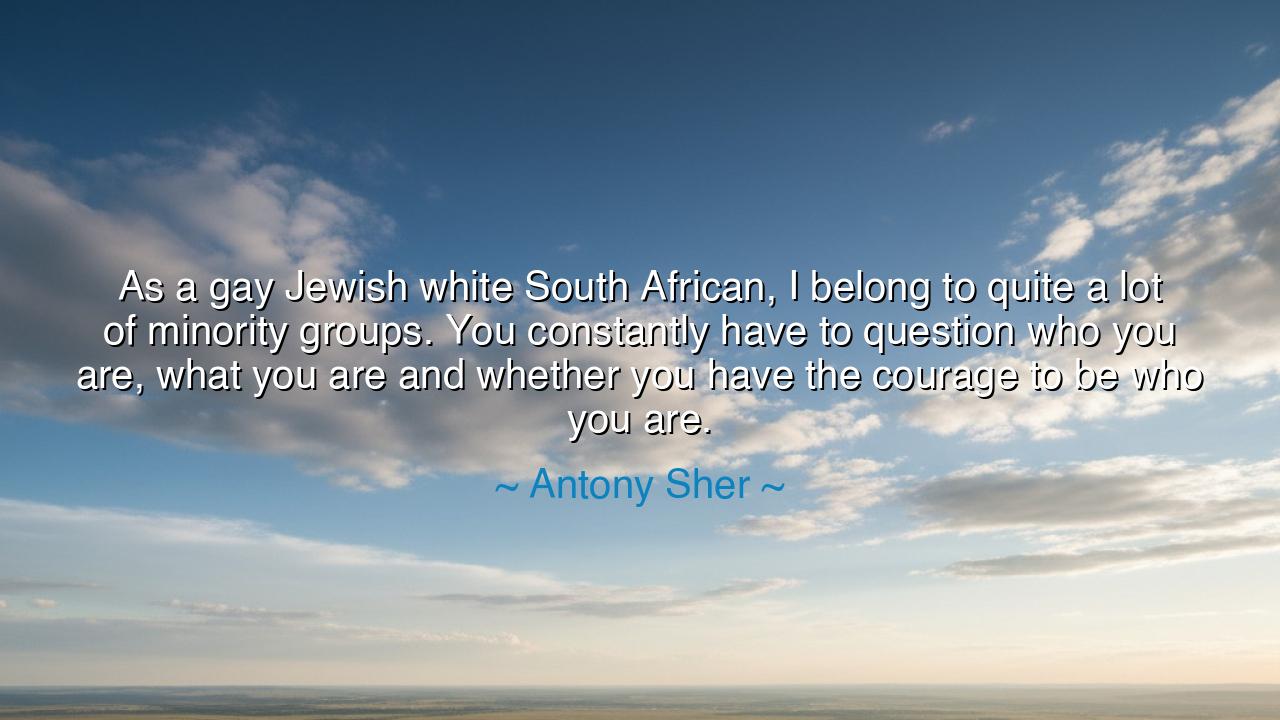
As a gay Jewish white South African, I belong to quite a lot of
As a gay Jewish white South African, I belong to quite a lot of minority groups. You constantly have to question who you are, what you are and whether you have the courage to be who you are.






“As a gay Jewish white South African, I belong to quite a lot of minority groups. You constantly have to question who you are, what you are and whether you have the courage to be who you are.” Thus spoke Antony Sher, the great actor and storyteller, whose life was a mosaic of identities, layered in conflict yet shining with truth. In these words, there is not only the cry of one man but the eternal struggle of all souls who walk the narrow path of selfhood amid the storm of the world’s judgment. His declaration is both confession and challenge—a call to awaken, to look within, and to ask, “Who am I when the world refuses to tell me?”
Born in the land of South Africa, where color and creed once divided brother from brother, Antony Sher carried within him the burden and brilliance of many identities. He was Jewish, inheritor of a faith tempered in exile and survival; white, in a land where privilege was both shield and wound; and gay, in a world that too often punished love for daring to wear its true face. Each identity was a mirror that reflected a different truth of his being, yet none could fully contain the vastness of his soul. Thus, he learned early the sacred art of questioning—the courage to ask, “What am I?” even when no answer comes. For in that questioning lies the essence of spiritual freedom.
To question who you are is not weakness—it is the beginning of wisdom. Those who never question themselves live like reeds in the wind, bending with every opinion, enslaved by the approval of others. But the one who dares to stand alone in the light of truth, though trembling, is like a mountain rooted in eternity. Antony Sher knew that identity is not a costume worn for the stage of society—it is a fire burning in the heart, shaped by pain, by heritage, by love. And the greater the diversity of one’s roots, the deeper and stronger the tree may grow—if only one has the courage to be.
History has seen many who, like Sher, bore the cross of multiple identities and refused to let the world define them. Consider James Baldwin, the Black, gay American writer who faced the fires of racial hatred and the cold of moral hypocrisy. He too spoke of the torment and the triumph of being many things at once. Baldwin did not deny any part of himself; he wove his identities together like a tapestry, and through his words, he turned pain into beauty. In his courage to be all that he was, the world found its mirror—and its conscience. So too did Antony Sher transform his personal struggle into art, standing upon the stage not as a man divided, but as a spirit whole and unafraid.
The heart of Sher’s wisdom is this: that identity is not given—it is forged. It is not found in the gaze of others, nor in the labels of birth, but in the quiet and often lonely work of the soul. The world may call you by many names—some false, some cruel—but only you can decide which ones to keep. And that decision demands courage—the courage to stand apart, the courage to love what the world despises, the courage to be authentic when imitation is safe. Such courage is not born of pride, but of truth. For when you embrace yourself as you are, without disguise, you honor the divine spark that made you.
The courage to be who you are is not a single act; it is a daily practice. Every morning the world will tempt you to wear its masks, to trade your truth for comfort, your uniqueness for acceptance. Yet remember this: conformity is a cage gilded with fear. Freedom lies in authenticity. Speak your truth, even if your voice trembles. Love who you love, even when love is costly. Honor your ancestors by living the fullness they were denied. To question yourself is to seek truth, but to accept yourself is to find peace.
Let this teaching be passed down: that to be many things is not confusion but richness. To belong to many worlds is to stand at the crossroads of humanity and see farther than those who walk only one road. The soul that questions itself grows wise; the heart that accepts itself grows kind; the life that unites both grows radiant. Therefore, O listener, be courageous in your identity. Do not shrink from the complexity of your being. Stand before the mirror of your truth and say, “This is who I am, and this is enough.” Then, and only then, will you know the deep joy of existence—the joy of living not as an echo of the world, but as the clear, unwavering voice of your own eternal self.






AAdministratorAdministrator
Welcome, honored guests. Please leave a comment, we will respond soon